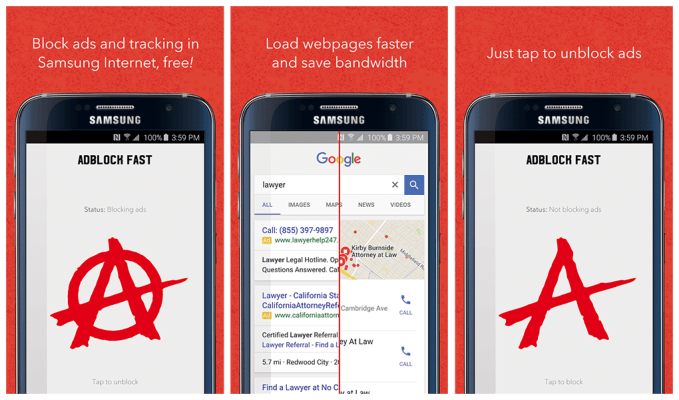Google appears to have reversed its earlier decision to ban ad blockers from the Google Play store – a move which had seen the company pulling apps like Adblock Fast and stalling the updates for others, like Crystal’s ad blocker. Now, following an appeal from Rocketship, the developers behind Adblock Fast, Google has re-approved and republished its app to Google Play.
The decision represents a change in course for Google, regarding its position on what sort of apps the company will allow in its app store for Android devices.
From a source with knowledge of the situation, TechCrunch learned at the time of the original decision that Google had planned to only support mobile browsers that could block ads – including those with built-in ad-blocking features, like the Adblock Plus browser, as well as those that supported ad blocking via extensions, as with Firefox, Javelin, and Dolphin browsers.
However, Google had decided that standalone ad blocking apps distributed via APKs, like Crystal and Adblock Fast, would not be permitted under its new guidelines.
Those apps and others had emerged following Samsung’s introduction of ad blocking support within its own mobile web browser in early February. The feature worked a lot like how Apple’s Safari supports ad blocking. That is, third-party developers can take advantage of Samsung’s new Content Blocker API which allows them to build apps that work the browser to block ads and other unwanted content that can slow down web pages, like trackers.

But there was already some indication that Google may have been debating its decision ahead of Adblock Fast’s reinstatement, as Google’s policy was being inconsistently applied.
While Adblock Fast was pulled, Crystal was merely slowed down, for example – Google blocked its app update from going through, citing the same “violation” of its Android Developer Distribution Agreement as the reason.
In Section 4.4, the company informs third-party developers that they cannot interfere with “the devices, servers, networks, or other properties or services of any third-party including, but not limited to, Android users, Google or any mobile network operator.”
As no further guidance was offered, affected developers said they understand Google’s request to mean they should not interfere with Samsung’s web browser.
That decision obviously didn’t make sense as Samsung’s release of its ad blocking API indicated that was exactly what the company wanted third-party developers to do.
TechCrunch understands from a person familiar with the situation at Google that the company will now allow those apps that integrate with one another app through authorized channels, like APIs, but will continue to prohibit apps on Google Play that interfere with the functionality of other apps in an unauthorized manner.
Rocketship says it submitted an appeal last Monday – the day its app update was rejected – which was before the app itself was pulled from the store on Tuesday.
Today, Rocketship explains what happened since. The company says it received an email on Friday noting that Google had accepted its appeal, then the app was republished this morning.
In addition to being back on Google Play, Rocketship was also able to update the app to version 1.1.0, which now extends support up to Android 4.0 and clarifies the onboarding experience for those users who didn’t yet have Samsung’s web browser installed.
As Google flip-flopped on its decision, other ad blockers makers remained more or less untouched by the shifting policy. For instance, Adblock Plus, which released a version of its ad blocker for Samsung Browser, tells us they never heard from Google nor had their app pulled.
Crystal also remains online. Its developer, Dean Murphy, tells us he appealed a few times, as well, and Google has just now accepted his update.
Google declined to comment.
Updated: 2/9/16, 9:30 AM PT to note Crystal’s update has now gone through and note Google’s response.







